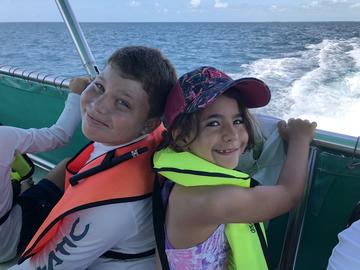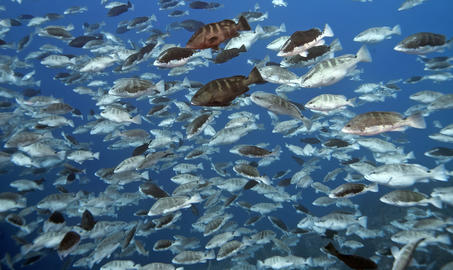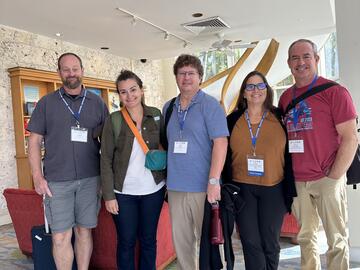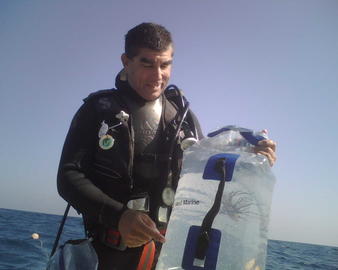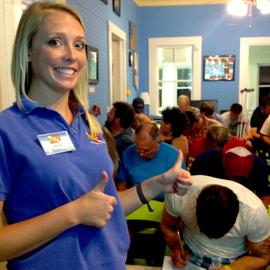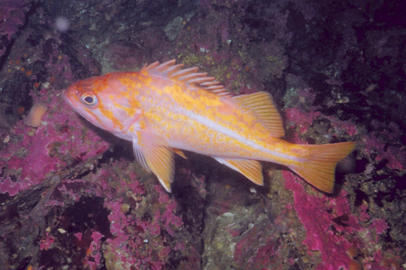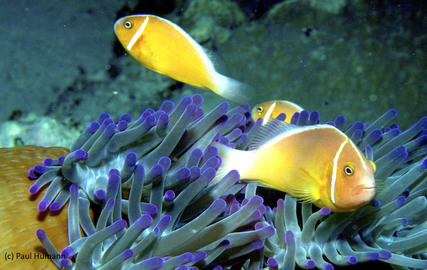It was a busy summer for REEF’s Explorers Education Program, between the Ocean Explorers Summer Camp and the “Nature Days” program with the Florida Keys Children’s Shelter. Throughout the summer, 80 children joined REEF to learn about marine conservation and environmental science in a fun, outdoor setting. Thank you to John Pennekamp Coral Reef State Park, Coral Reef Park Company, Florida Keys Wild Bird Rehabilitation Center, Island Dolphin Care, and the Everglades Outpost who made these programs possible.
Last month, the Grouper Moon Project - a highly successful conservation science collaboration between REEF and the Cayman Islands Department of Environment - wrapped up its 18th year of work in Little Cayman. Because all of the field work takes place during a few weeks around the winter full moons when the Nassau Grouper aggregate to spawn, the team prepares all year to ensure success for the big event. As we reported in last month’s e-News, because of this year's moon calendar, we sent research teams to Little Cayman in both January and February.
Last month, a team of scientists represented REEF at the 76th annual Gulf and Caribbean Fisheries Institute (GCFI) conference, held in The Bahamas. REEF programs and data were represented by REEF Co-Executive Director, Dr. Christy Pattengill-Semmens, and Conservation Science Associate, Lex Bryant, as well as our partners from Scripps Institute of Oceanography (Dr. Brice Semmens) and Oregon State University (Dr. Scott Heppell).
While we all knew it was just a matter of time, the call still came with a bit of surprise and dread as the first confirmed lionfish sighting in the Florida Keys came in on January 6th, 2009. REEF member Becky Fowler, from Greenville, SC, was diving just offshore of the Benwood Wreck in Key Largo when she spotted the invasive lionfish near the base of a ledge at 66'. With all of the recent focus and outreach efforts that REEF has been forwarding to our members, she knew immediately that she needed to document the sighting and gather a detailed description of its location.
Package Includes Seven nights on board the Sun Dancer II, all meals and beverages (including well brands of alcohol and Belikin beer), transfers from/to Belize International Airport, five and ½ days of diving up to five dives per day, other standard Dancer Fleet services and amenities.
$1895 pp (deluxe cabin, 10 available) or $2095 pp (master cabin, 4 available), + $95 port fee and $15 recompression chamber fee
+ $250 REEF Program Fee per diver will be added to each package to cover the cost of the group leader, seminar and survey materials, and data management.
When University of Kansas graduate Keri Kenning joined REEF in August 2012 as a Marine Conservation Intern, Keys residents constantly reminded her, “You’re not in Kansas anymore.” Five months, sixty dives, and zero lionfish stings later, Keri has abstained from clicking those ruby red heels together and returning to Kansas. She is staying at REEF headquarters in Key Largo as the new Communications and Affiliate Program Manager. Keri graduated in May 2012 from the University of Kansas with a Bachelor of Arts in Biology and University Honors.
$1,726 per person double occupancy ($2,146 single occupancy) - includes: lodging for 7 nights at the Kura Hulanda Lodge, breakfast each morning, 5 days of 2-tank boat dives, r/t airport transportation on Curacao, ground transportation for group activities, and all taxes.
+$200 REEF Program Fee per diver will be added to each package to cover the cost of the group leader, seminar and survey materials.
Every month, scientists, government agencies, and other groups request raw data from REEF’s Fish Survey Project database. Here is a sampling of who has asked for REEF data recently and what they are using it for:
- A scientist from Bermuda Institute of Ocean Sciences (BIOS) requested REEF data to evaluate fish assemblages in Bermuda with regard to no-take reserves, comparing shallow vs. deep water habitats, and to evaluate the impact of invasive lionfish.
Thank you so much to everyone that donated during our summer matching campaign! We reached our goal, as REEF members donated more than $56,100 this summer to fund our critical programs. These donations were matched dollar for dollar, up to $55,000 by the Curtis and Edith Munson Foundation, the Henry Foundation, and the Pelton Charitable Foundation. From research on Grouper Moon to controlling invasive lionfish programs and discovering new species, REEF's programs are increasing knowledge of the unknown beneath our seas!
Every month, scientists, government agencies, and other groups request raw data from REEF’s Fish Survey Project database. Recent examples of data requests include:
- Staff from MacArthur State Beach Park in Florida are using REEF data to evaluate fish populations in the park.
- Researchers at SeaDoc Society and Washington Department of Fish and Game are using REEF data to evaluate Northern (Pinto) Abalone in Washington State

